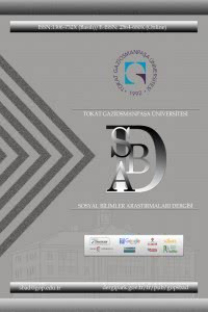BİR İŞLETMENİN HASILAT DÖNGÜSÜNÜN KURUMSAL KAYNAK PLANLAMA SİSTEMİ İÇİNDEKİ İŞLEYİŞİx
THE OPERATION OF A BUSINESS’S REVENUE CYCLE IN THE ENTERPRISE RESOURCE PLANNING SYSTEM
___
- APICS, (2011), “Operation Management Body of Knowledge Framework”, http://www.apics.org/docs/default-source/industry-content/apics-ombokframework.pdf?sfvrs n=2,
- Aslanzade, S., (2017), Hasılat Döngüsünde Hile Denetimi, (Yayınlanmamış Yüksek Lisans Tezi), İstanbul Aydın Üniversitesi Sosyal Bilimler Enstitüsü, İstanbul (Türkiye)
- Bayraktar, E. ve Efe. M. (2006), “Kurumsal Kaynak Planlama ve Yazılım Seçim Süreci”, Selçuk Üniversitesi Sosyal Bilimler Enstitüsü Dergisi, (15), 689-709
- Bodnar, G.ve Hopwood, W.S., (2003), “Accounting Information Systems”, New Jersey: Pearson Prentice Hall
- Cosmin, A., (2016), “The General Architecture of The Accounting Information System at The Trade Entities”, Unıversity of Targu Jui Annuals-Economy Series, (4), 127-135
- Dinç, E. ve Karakaya, A., (2014), “Muhasebe Bilgi Sistemi ve Kurumsallaşma Düzeyi Arasındaki İlişki’ye Yönelik Bir Araştırma”, Selçuk Üniversitesi İİBF Sosyal ve Ekonomik Araştırmalar Dergisi, 14 (27), 21-50
- Hall, James A., (2011), “Accounting Information System 6.Ed”, Mason: Cengage Learning
- Karagül, A. A., (2006), Bilgi Yönetimi Sürecinde Kurumsal Kaynak Planlaması Uygulamalarının Muhasebe Bilgi Sistemine Etkisi ve Bir Uygulama, (Yayınlanmamış Doktora Tezi), Eskişehir (Türkiye)
- Kıymaz, M., (2013), Muhasebe Bilişim Sisteminin Küçük Orta ve Büyük Boy işletmeler (KOBİ) Üzerindeki Etkisi: Sakarya İlinde Bir Uygulama, (Yayınlanmamış Doktora Tezi), Sakarya Üniversitesi Sosyal Bilimler Enstitsü, Sakarya (Türkiye)
- Markus, M.L. ve Tanis. C., (2000), “The Enterprise System Experience from Adoption to Success”, Framing the Domains of IT Research, 173-207
- Romney, M.B. ve Steinbart P.J., (2000), “Accounting İnformation System”, New Jersey: Prentice Hall
- Sürmeli, F., (1998), “Muhasebe Bilgi Sistemi”, Eskişehir: Anadolu Üniversitesi Yayınları
- Türel, A., (2018), “Muhasebe Bilgi Sistemleri”, İstanbul: Çağlayan Kitapevi
- Uwizeyemungu, S. ve Raymond, L., (2005), “Essential Characterıstıcs of An Erp System: Conceptualizatıon and Operationalization”, Journal of Information and Organizational Sciences, (29), 69-81.
- ISSN: 1306-732X
- Yayın Aralığı: 2
- Başlangıç: 2006
- Yayıncı: Gaziosmanpaşa Üniversitesi Sosyal Bilimler Enstitüsü
DİNLEME ÖZ YETERLİK ALGISI ÜZERİNE BİR ARAŞTIRMA: ÖĞRETMEN ADAYLARI ÖRNEĞİ
BİR İŞLETMENİN HASILAT DÖNGÜSÜNÜN KURUMSAL KAYNAK PLANLAMA SİSTEMİ İÇİNDEKİ İŞLEYİŞİ
Buket GÜDELCİ, Erkin Nevzat GÜDELCİ
TEBÂREKE KELİMESİNİN SEMANTİK ANALİZİ
KUZEYDOĞU ANADOLU BÖLGESİNDE TESPİT EDİLEN KÖROĞLU KALELERİ
BİR İŞLETMENİN HASILAT DÖNGÜSÜNÜN KURUMSAL KAYNAK PLANLAMA SİSTEMİ İÇİNDEKİ İŞLEYİŞİx
Buket GÜDELCİ, Erkin Nevzat GÜDELCİ
İŞGÜCÜ PİYASASINDAKİ GELİŞİM SÜRECİ AB-OECD-TÜRKİYE KARŞILAŞTIRMASI
